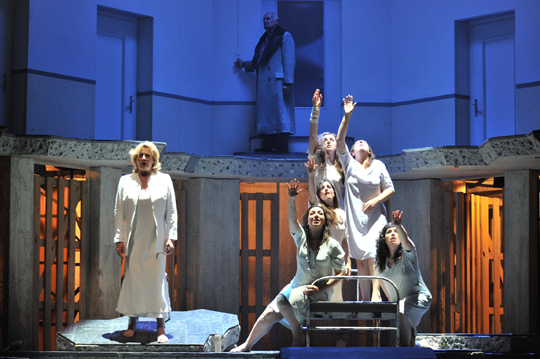P.Dukas, Ariane et Barbe Bleue: Soloists, Orquestra Simfònica y Cor del Gran Teatre del Liceu. Conductor: Stéphane Denève. Barcelona’s Liceu. 29.06.2011 (JMI)
Production: Opernhaus Zurich
Director: Claus Guth
Sets and Costumes: Christian Schmidt
Lighting: Júrgen Hoffmann
Cast:
Ariane: Jeanne-Michele Charbonnet
Barbe Bleue: José Van Dam
Nourrice: Patricia Bardon
Selysette: Gemma Coma-Alabert
Ygraine: Beatriz Jiménez
Melisande: Elena Copons
Bellangere: Salomé Haller
Alladine: Alba Valldaura

French composer Paul Dukas wrote an important catalogue of works, including opera, ballet, symphonic and chamber music, compositions for solo instruments and vocal music. Despite all this, if we asked music lovers about Dukas, they could probably mention The Sorcerer’s Apprentice as his best known work—thanks to Mr. Disney—but might have difficulties to name a second work by Dukas.
Ariane et Barbe Bleue is the only opera he wrote and premiered at the Opera Comique in Paris in 1907. The Liceu’s program says that these performances represent the premiere of this opera in Spain… but Ariane et Barbe Bleue was premiered in Spain in February 1913 at Madrid Teatro Real. Still, a hundred-year absence seems like ‘always’.
 P.Dukas, Ariane & Barbe Bleue, Botstein / BBC SO et al. Telarc     |
Paul Dukas was a great admirer of Maurice Maeterlinck, author of this drama, based on the story by Charles Perrault. Initially, Edward Grieg was responsible for putting the drama in music, but eventually it was Paul Dukas who carried forward. The opera has an excellent music, with a rich orchestration, although you do not find those inspired catchy tunes to be repeated while leaving the theatre. With all the beauty the work offers, it’s hard to understand that this opera is so rarely performed.
The dramatic core of the opera is based on the figure of Ariane, trying to liberate Bluebeard’s first wives, who ultimately refuse to be freed. It highlights the contrast between liberation and self-liberation, which is the only true liberation. Maeterlinck’s thesis would be that freedom is not a given, but needs to be struggled for… and nothing is more difficult than living in freedom. Undoubtedly, the subject is ever-current. Claus Guth’s production from Zurich understands this and puts the theme of liberation at the center of the stage production, doing a great job with the five wives who show us their fears and doubts up to the final decision to stay rather than leg it with Ariane. The sets provide a confined space with two levels, with six doors on the upper level and a basement where the poor women live in a dungeon.
The musical direction was in the hands of Stephane Deneve, whose reading was fully convincing, particularly in the third act. This opera requires two great performers: Ariane… and the conductor. Both are critical to the success of the opera and in this sense Stephane Deneve was up to the task. He got a good performance from the orchestra, although it continues to be too modest for this important opera house.
The cast features a protagonist, Ariane, and a supporting characters, among them Bluebeard himself. Ariane was originally Eva-Maria Westbroek, but she canceled, replaced by Jeanne-Michele Charbonnet, whose performance was quite convincing, but whose voice is rather in decline, with very tight high notes and a wide vibrato. Her quality as interpreter makes you forget the problems and focus on her work on stage.
Patricia Bardon was also good in the part of the Nurse, though also tight at the top of the range. Barbe Bleue’s character has a great importance dramatically, but vocally is a rather episodic character, played here well enough by veteran José Van Dam.
Very well cast were the five wives of Barbe Bleue, two sopranos, two mezzo sopranos and one actress. Among them the most important is Selysette, very well acted and sang by Gemma Coma-Alabert.
José M. Irurzun